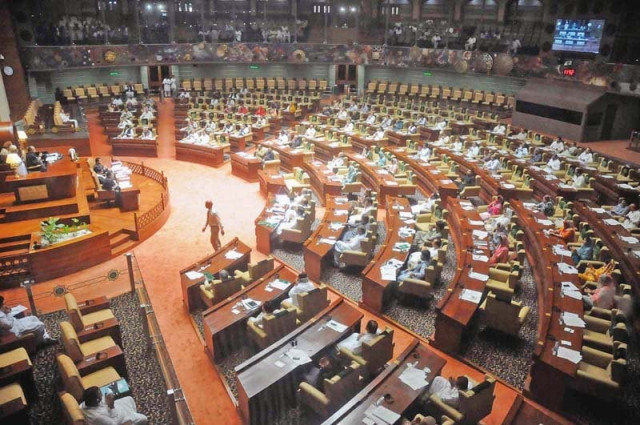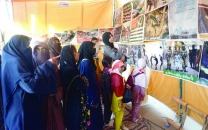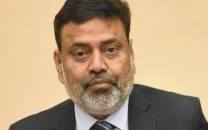Sindh Assembly snubs governor’s objections, passes laws anyway
The bills will be sent to the governor again and will become law whether he approves or not

Sindh Assembly Session. PHOTO: FILE
The Sindh government, with the consultation of different stakeholders and opposition parties, had passed both bills unanimously earlier in the current session.
But the Sindh governor had objected over the Alternative Dispute Resolution (ADR) bill, saying, "There should be mediatory conciliators".
Regarding the second bill, the governor referred to the apex court's decision to hand over the National Institute of Cardiovascular Diseases (NICVD) to the federal government.
"It will be in contravention of the apex court's order. The Sindh government cannot build the same kind of facility in the same premises where the NICVD is located."
Sindh govt's response
Responding to the governor's objections, Chief Minister Syed Murad Ali Shah said that the governor's dissent were unreasonable.
Sindh governor fined for violating traffic rules
"The role of mediatory conciliators is mentioned in the bill. Perhaps the governor has not properly read the bill," he said.
"We have even taken the Sindh High Court into confidence over the ADR bill and its clauses."
With regard to the Sindh Institute of Cardiovascular Diseases Bill, the CM said that under this law, the Sindh government had established its own cardiovascular institute in the province.
"Health is a provincial subject. After the 18th Amendment, this has been devolved to Sindh," he said, adding that no one could stop Sindh from making the law and taking over health facilities.
"We are going to file review petitions against the Supreme Court's decision to hand over Jinnah Postgraduate Medical Centre (JPMC), NICVD and the National Institute of Child Health to the federal government," the CM announced.
The Sindh government, said the CM, has built cardiovascular institutes in various districts of the province and will take over these institutes through this law.
"We have spent billions of rupees on these centers and would not let anyone ruin them," he asserted, adding that the budget of JPMC and NIVCD was in the millions when the provincial government took over and they had allocated billions of rupees to provide state-of-the-art facilities there.
"We will take what is rightfully ours because the Constitution has given us these rights," he said, appealing to opposition members to support the Sindh government. In any case, the Pakistan Peoples Party had the simple majority to get these bills passed again, he reminded the House.
Sindh govt rejects KTC formed by Centre for development work
"After passing these bills, we will send them to the governor again. The bills will convert into Acts, whether the governor gave his assent or not," he said.
Earlier, opposition members, including Mohammad Hussain and Khawaja Izharul Hasan of the Muttahida Qaumi Movement-Pakistan (MQM-P) and leader of the opposition Firdous Shamim Naqvi suggested referring these bills to a special committee for deliberation.
As the CM finished his speech, parliamentary minister Mukesh Kumar Chawla put the bills in the House, which were passed.
Published in The Express Tribune, January 31st, 2019.



















COMMENTS
Comments are moderated and generally will be posted if they are on-topic and not abusive.
For more information, please see our Comments FAQ